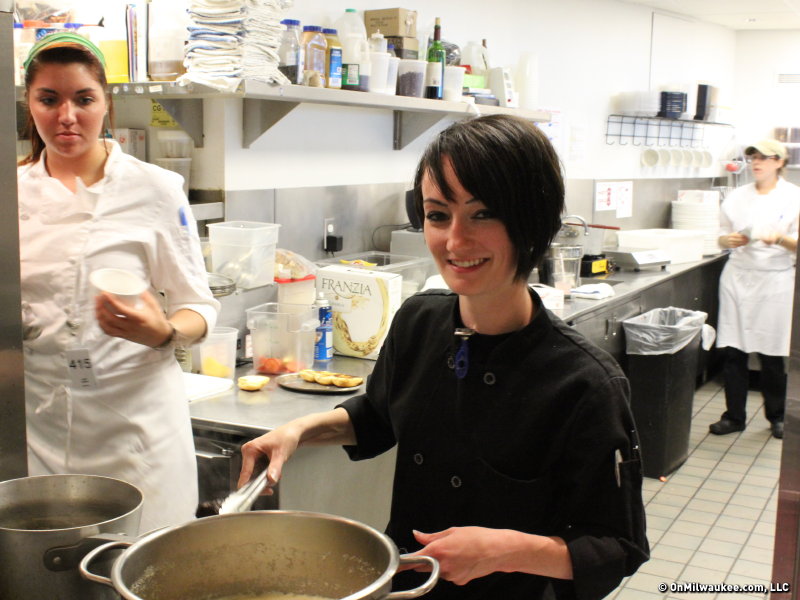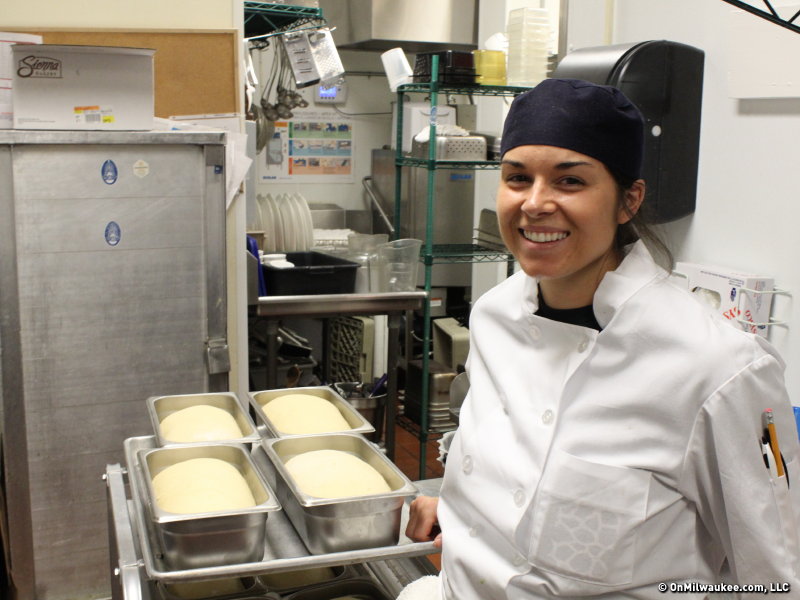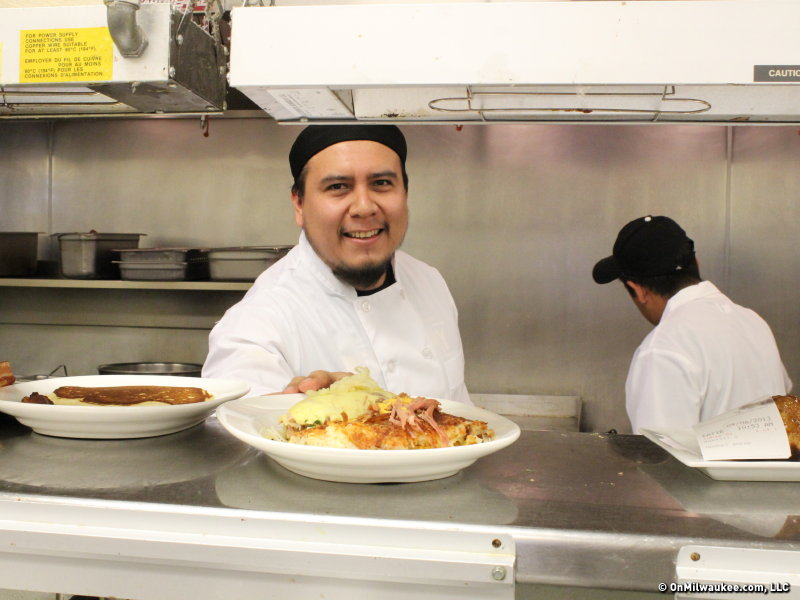Milwaukee Art Museum’s Café Calatrava … it’s a beautiful white stark space that makes the perfect canvas for lovely food. And that’s a good thing. After all, the menu changes multiple times a year as the kitchen staff works to create a culinary experience that's in step with the latest exhibition on view upstairs.
Jamie Nelson is one of the worker bees in the kitchen who makes that happen. She’s a slight, spritely sort with a quiet disposition and an unassuming manner. But, Nelson isn’t exactly what she seems; in fact, in the kitchen, she’s developing skills that one day will make her a force to be reckoned with.
There’s a light in her eyes when she talks about her work in the food industry – which began when she worked at a Dairy Queen in South Milwaukee while growing up. From there, she moved on to work at the Milwaukee County Zoo, where she assisted them in revamping the offerings at the Flamingo Café.
And finally, three years ago, Nelson landed at Café Calatrava, where she’s worked her way up the line and currently works with Chef de Cuisine Micah Kaufmann to design the café’s menus and assist with banquet and event prep.
I sat down with Nelson last week to chat about her experience creating artful food under one of Milwaukee’s most beautiful sculptures.
OnMilwaukee: What made you choose food as your career?
Jamie Nelson: My whole family was always in the kitchen. Holiday get-togethers were always really centered around food and family. My mother and grandparents always did the bulk of the cooking. I wanted to be in the kitchen to see what they were doing. My grandparents would take cooking classes and they’d come home and share what they learned.
Later in life when it was time to go to college, I wasn’t really sure what I wanted to do. I thought I wanted to be a sports reporter. But, I realized that sitting at a desk wasn’t really my thing. I decided I needed something more hands-on. My mom actually was the one who suggested I think about going into cooking. I don’t think I even realized that that was even an option until she mentioned.
And now … I hope I always want to keep cooking. I think the day I don’t want to cook will be a sad day.
OMC: What do you wish you had known when you took your first sous chef position?
JN: I’ve been here at Café Calatrava for about three years. I started as a prep cook and then moved onto garde manger. This is my first sous chef position; I stepped up into the role when our last chef left. As a result, nothing really surprised me here. We have a really tight-knit family setting here at the Calatrava, and I went in knowing what I was getting into. The chefs have pushed me and given me extra tasks around the kitchen.
OMC: From your point of view, what’s the most important role a sous chef plays?
JN: Honestly, it’s kind of just keeping the kitchen running. For most of my experiences, the executive chef has taken on a more administrative role, and the sous is the one who is filling in where needed and making sure everything runs smoothly.
We do so many events here that I need to make sure all the events go out on time. It’s also up to me to keep the vibe positive in the kitchen
OMC: What’s the most challenging part of your job?
JN: Becoming peoples’ boss. I’ve been just one of the guys – everyone’s friend – for so long. And now, when someone is doing something wrong, I have to correct them. It’s not always easy for me.
OMC: What’s the best part?
JN: I’m doing what I love to do. I feel like, as sous, I’m in the kitchen more. I can work downstairs in the banquet kitchen, move around to different stations. In the banquet kitchen there’s almost an entirely new set of guys I get to work with and learn from.
OMC: Speaking of learning, what have you learned most about yourself while working in the kitchen?
JN: That I can do it. I guess I’m naturally a timid person and I kind of psych myself out when it comes to trying new things or facing challenges. But, I’ve found that if I just dive in and do it I can get anything done.
OMC: Is there an example of something you just dove in on?
JN: When I was a line cook, moving up on the line from garde mangier to the grill cook … it was intimidating. The grill cooks are the rocks on the line, and they keep everything moving. The position was so intimidating to me because I knew how intense it was. Finally, my supervisors at the time were asking "are you ready to move up?" I wasn’t sure. So, one day they just moved me up, and I was just fine.
OMC: Of the chefs you’ve worked for, from whom did you learn the most? Why?
JN: I’d say Desirae Hornsby. She’s a former chef de cuisine here. She was that big sister figure, an empowering figure that showed me that girls can do this too – and she pushed me. She saw the fire in my eyes, and she pushed me. She’s been a huge part of my career.
She also kind of took me aside once she saw that I had the drive to get better and move up, and she showed me the managerial side. So, that’s why I had a bit of an idea of what it would be like when I moved up to sous chef.
OMC: How would you describe your cooking style or philosophy about food?
JN: I’m a people pleaser by nature, so I want to make great food that people love and remember. I want everyone who eats my food to be completely satisfied. So, whether it’s using simple ingredients, cooking at home, or using higher end ingredients at the restaurant, I really love it when people enjoy what I make.
OMC: What’s the one thing you wish people knew about sous chefs?
JN: We’re here. We exist. A lot of people I talk to, when I tell them what I do, they don’t even know what a sous chef is.
OMC: Where do you envision yourself five, 10 years from now?
JN: If I’m not here cooking, I’ll be somewhere cooking. I’ve decided that this is my life and I want to spend my life cooking. I still have a lot to learn before taking an executive position or having my own place.
I want to learn everything about everything – food science, pastry, sugar and chocolate work, butchery. I love learning about why food does what it does … the chemical makeup of a particular food. I’m a geek about it. And in the future, when I’m showing somebody how to do it, I can really explain why it happens.
OMC: You mentioned butchery. Do you get to do much with butchery here?
JN: Some basic cleaning of meat. But it’s definitely something I’m interested in learning.
OMC: If you could call the shots on the menu, what would you cook?
JN: Actually, Micah (Kaufman) and I collaborate quite a bit on the menu here. The heirloom caprese salad is one of my dishes. And I created a duck l’orange for this menu. It’s one of the things I love about working here at the café, is that we constantly are changing things up to go with each exhibit.
OMC: Have you had a favorite exhibition?
JN: A few years ago we had a European design exhibit … that was great. And now we have the "30 Americans" exhibit.
The Euro Design menu was in the beginning of my time here, and I was just testing the waters. We did a beet ravioli salad with goat cheese and orange segments, a smoked trout salad with a beet vinaigrette … the menu was divided into themes along with the exhibition.
For the "30 Americans" exhibit, we’re featuring Cajun chicken quarters, the duck l’orange, caprese salad along with an airline chicken breast with succotash and creamy grits and barbeque shrimp with grits.
OMC: Mmm. Southern fare.
JN: Yes, it’s been really fun.
OMC: What else should Milwaukee know about you?
JN: I go home every day to my daughter. We have a garden that we keep at home. She loves it that there are things out there every morning – strawberries. And she’s not your typical 4-year-old, she really loves everything. Even when I go home, I love to cook and do my own thing, and she’s always there to taste test.
OMC: Does she give good feedback?
JN: More often than not yes.
OMC: That’s cool. Before I wrap things up, I have one more question. What’s your impression of the Milwaukee food scene?
JN: I’d say I really like the direction it’s going. It’s kind of up and coming. I feel like a lot of the chefs I’ve met are younger and just coming up in the food scene. With more people becoming knowledgeable and interested about food, that helps a lot … more great chefs to stay and do great things in this area, rather than moving away. I’m excited to be a part of it, and excited for what’s to come.
As a passionate champion of the local dining scene, Lori has reimagined the restaurant critic's role into that of a trusted dining concierge, guiding food lovers to delightful culinary discoveries and memorable experiences.
Lori is an avid cook whose accrual of condiments and spices is rivaled only by her cookbook collection. Her passion for the culinary industry was birthed while balancing A&W root beer mugs as a teenage carhop, fed by insatiable curiosity and fueled by the people whose stories entwine with every dish. Lori is the author of two books: the "Wisconsin Field to Fork" cookbook and "Milwaukee Food". Her work has garnered journalism awards from entities including the Milwaukee Press Club. In 2024, Lori was honored with a "Top 20 Women in Hospitality to Watch" award by the Wisconsin Restaurant Association.
When she’s not eating, photographing food, writing or planning for TV and radio spots, you’ll find Lori seeking out adventures with her husband Paul, traveling, cooking, reading, learning, snuggling with her cats and looking for ways to make a difference.







